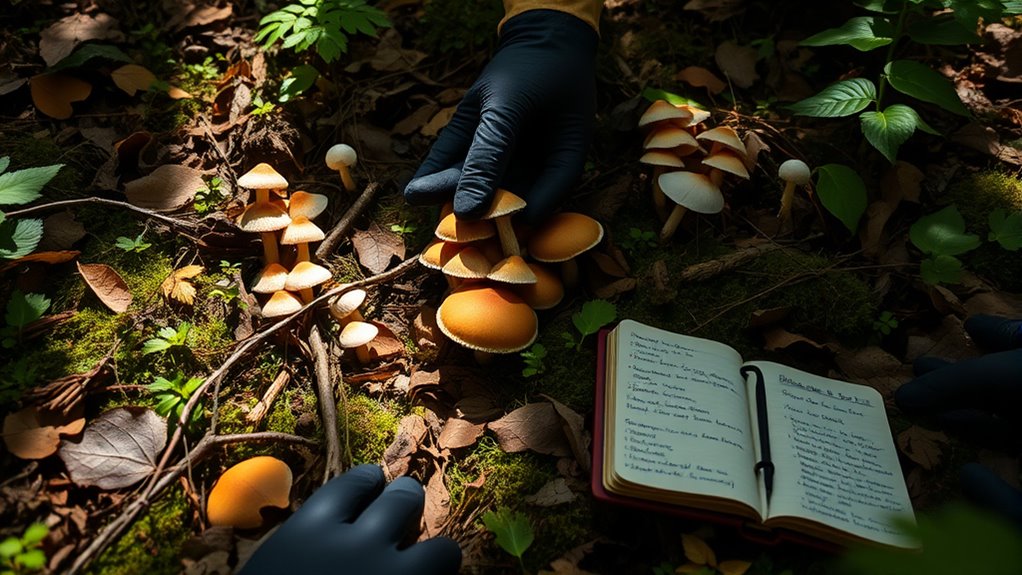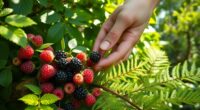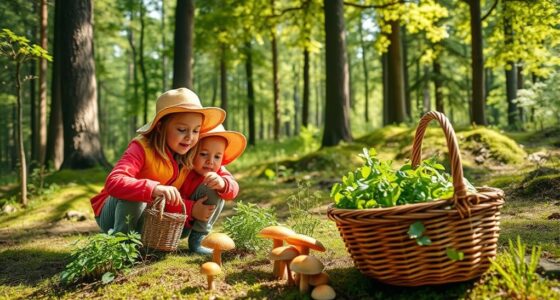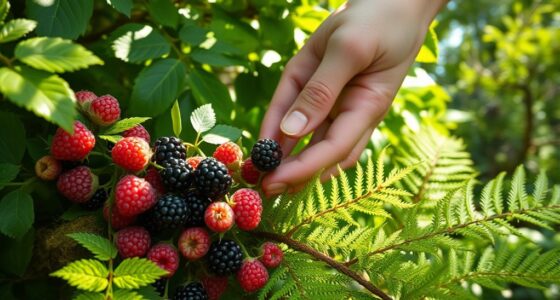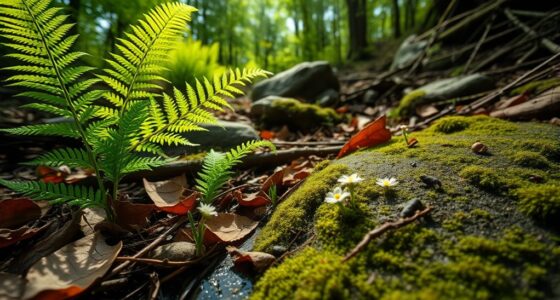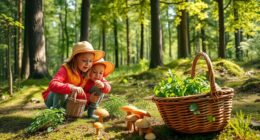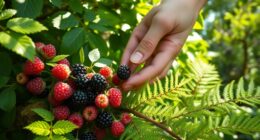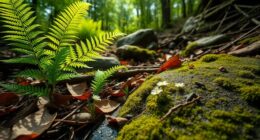When foraging, you need to be aware of federal, state, and local laws that regulate what and where you can collect wild plants and fungi. Many protected areas and national parks restrict harvesting, and violations can lead to hefty fines or jail time. Always get landowner permission for private property and distinguish between personal use and commercial foraging, which has stricter rules. Understanding this legal landscape helps you forage responsibly—more details await to help you stay compliant and ethical.
Key Takeaways
- Foraging on federal lands generally requires permits and is often restricted, with penalties for violations.
- State and local laws vary; some areas permit personal use, while others have strict restrictions on species and methods.
- Foraging in protected areas like national parks is usually prohibited without explicit permission, especially for commercial purposes.
- Harvesting protected or endangered species can lead to significant fines, jail time, and legal penalties.
- Always obtain landowner permission for private property and follow ethical, sustainable practices to avoid legal issues.
Overview of Federal Foraging Regulations
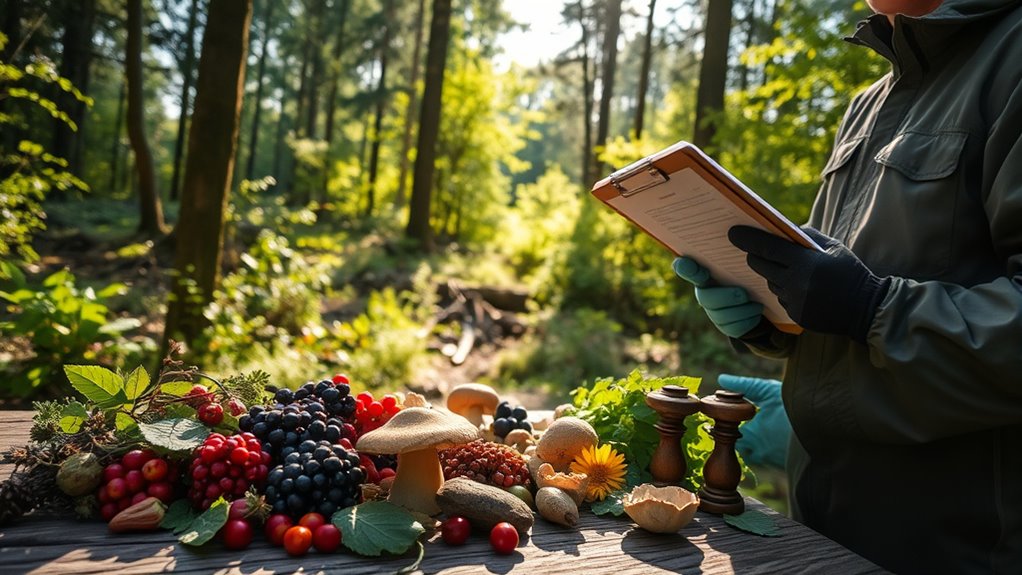
Have you ever wondered what rules govern foraging on federal lands? Federal regulations generally prohibit foraging in many areas unless explicitly allowed. Different agencies, like the National Park Service and the U.S. Forest Service, oversee specific lands, each with its own rules. Essential oils for plant identification can be helpful in recognizing edible or medicinal plants in the wild. Furthermore, understanding federal land regulations can help you stay compliant and avoid accidental violations. Being aware of permitting requirements is also crucial to ensure legal foraging practices. Knowing how to identify edible plants safely can enhance your foraging experience and prevent accidental ingestion of toxic species. Additionally, staying informed about local conservation policies can aid in responsible harvesting and environmental protection. Violating these regulations can lead to fines or even jail time, depending on the severity. Usually, you’ll need permits to forage, especially for collecting forest products. Regulations differ widely—what’s allowed in a national forest might be banned in a national park. For example, some areas restrict gathering certain plants or minerals. Staying informed about these rules helps you avoid legal trouble and protects the environment you’re enjoying. Always check specific regulations for the area you plan to visit.
State Laws and Their Variability
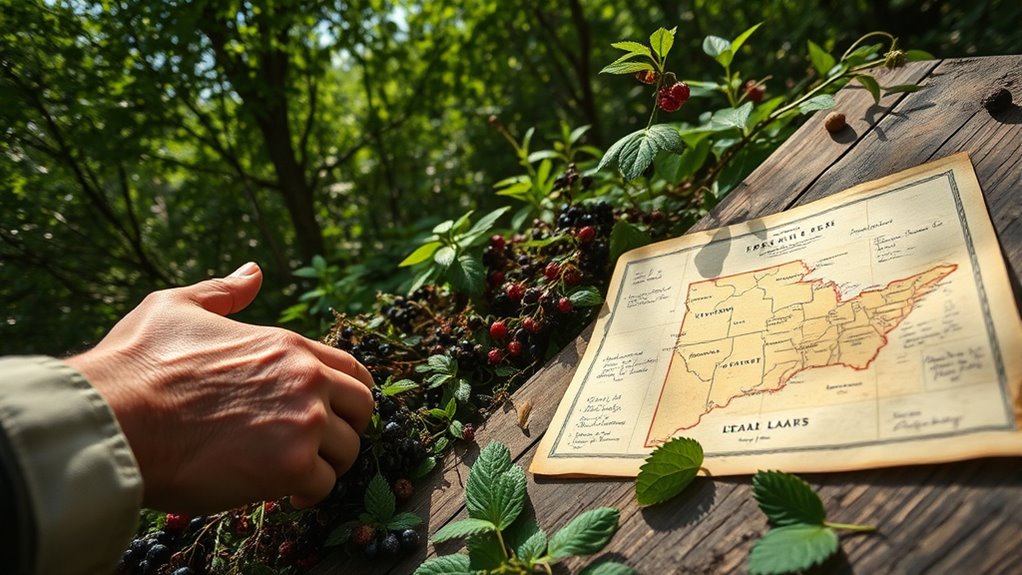
State laws governing foraging differ widely from one state to another, making it essential to know the specific regulations in your area. Some states, like Alaska, have protective laws that favor personal use, while others, such as California, impose strict restrictions. Understanding creative practice overview can help in developing responsible foraging habits that respect local regulations. Enforcement varies depending on local authorities, including park rangers and law enforcement in national forests and wildlife refuges. Certain species, especially endangered or protected plants, may be off-limits in some states. Understanding juice packaging and storage and their regulations can be crucial in ensuring responsible foraging practices, particularly when collecting plants for propagation or sale. Additionally, some states may have specific rules about harvesting methods, including tools used or seasonal restrictions, to prevent overharvesting. Being aware of supermarket hours and their regulations can also help in planning foraged product sales and compliance.
Local Ordinances and Municipal Rules
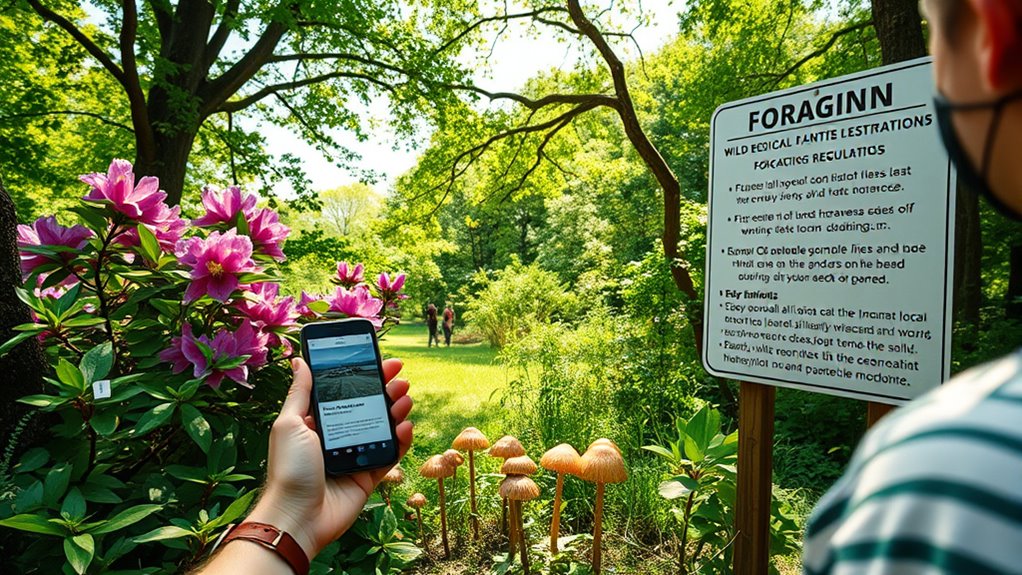
Local regulations governing foraging can vary widely between municipalities, making it vital to familiarize yourself with specific rules in your area. Many local laws are codified in ordinances that address zoning, environmental protection, and land use, which can restrict or regulate foraging activities. Some areas require permits to forage on public lands, and violating these rules can lead to fines or penalties. Certain plants may be protected or prohibited from harvest altogether, especially on public or environmentally sensitive lands. Enforcement agencies monitor compliance, and community outreach programs often promote responsible foraging practices. Additionally, understanding the contrast ratio of your environment can help determine the best conditions for sustainable foraging, especially in shaded or dark areas. Awareness of regulatory enforcement measures can help foragers avoid inadvertent violations and stay compliant with local laws. Recognizing the financial risks associated with non-compliance can motivate foragers to stay informed about local laws. Being aware of environmental protection laws helps ensure that foraging does not harm local ecosystems. Staying informed about local regulations and potential penalties is essential for responsible foraging. Respecting private property rights is essential—always seek permission before foraging on private land. Staying informed about local rules ensures you forage responsibly and avoid legal issues while supporting conservation efforts.
Restrictions in National Parks and Protected Areas
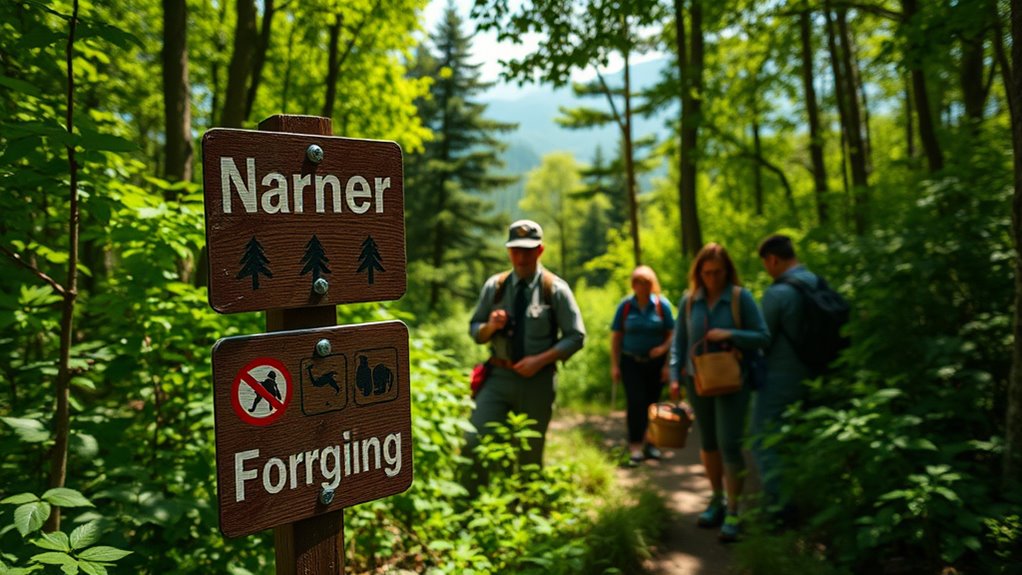
Foraging in national parks is generally restricted to protect the environment, with exceptions made only when a park superintendent grants permission. Most parks prohibit collecting plants, fruits, or fungi, especially for commercial use. However, about 75% of parks allow some foraging, such as hand-picking berries and nuts for personal use, under specific rules. Indigenous tribes may gather plants for traditional purposes through special agreements. Each park sets its own regulations, often requiring permits or permissions, and enforces rules through a superintendent’s compendium. Violations can lead to fines or jail time. Restrictions aim to prevent habitat disruption, control invasive species, and promote sustainable harvesting. Understanding the ecological impact of foraging activities helps ensure that natural resources are preserved for future generations. Consulting with park officials and familiarizing oneself with the local regulations can help prevent inadvertent violations. Being aware of protected areas where foraging is strictly forbidden can prevent accidental trespassing and legal issues. Additionally, understanding regulatory compliance helps protect both visitors and the environment. Recognizing the importance of environmental conservation can motivate responsible foraging practices. Always check local rules before foraging to avoid legal issues and protect the park’s ecosystems.
Legal Penalties for Foraging Violations
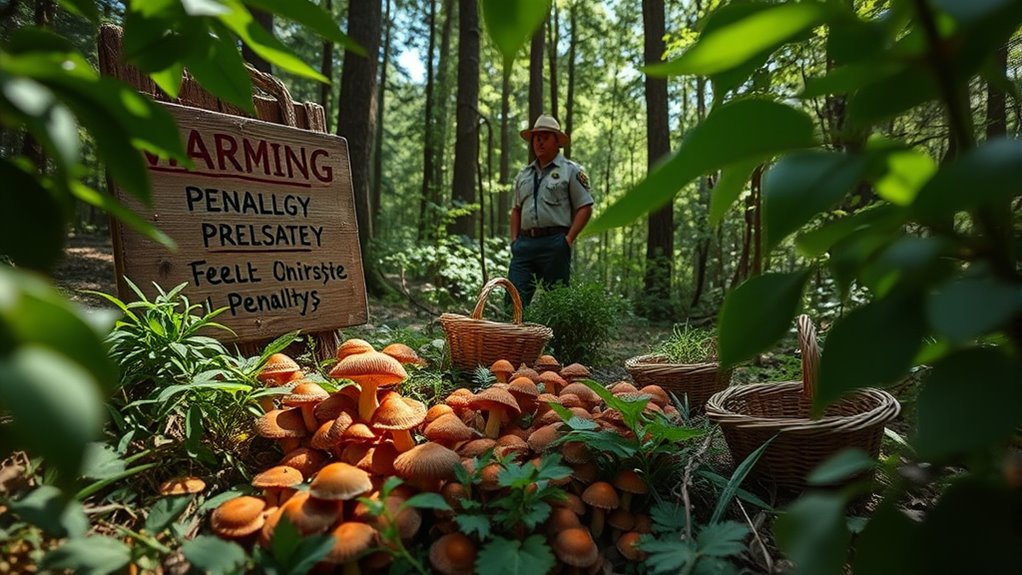
Have you ever wondered what happens if you violate wildlife laws while gathering plants or fungi? In Florida, wildlife violations are categorized from Level 3 to Level 4, with penalties ranging from misdemeanors to felonies.
For example, illegal wildlife possession can lead to up to a year in jail and a $1,000 fine, while serious offenses like harming endangered species can result in third-degree felonies with up to five years in prison and fines up to $5,000. Wildlife violation severity often determines the specific penalties imposed. Understanding the state wildlife laws and their enforcement helps in avoiding inadvertent violations. Additionally, technological advancements such as AI in Education are increasingly being used to educate the public about legal compliance and conservation efforts, promoting cultural intelligence in environmental stewardship.
Repeated violations often lead to license revocations or permanent bans. Trespassing or illegal sale of wildlife can incur additional fines and restitution.
Penalties vary across jurisdictions, but Florida’s statutes, such as Chapter 379, clearly outline serious consequences.
Violating these laws can also jeopardize your ability to renew or retain wildlife-related licenses. Understanding the regional legal resources available in your area can help ensure compliance and avoid penalties.
Ethical Considerations and Sustainable Practices
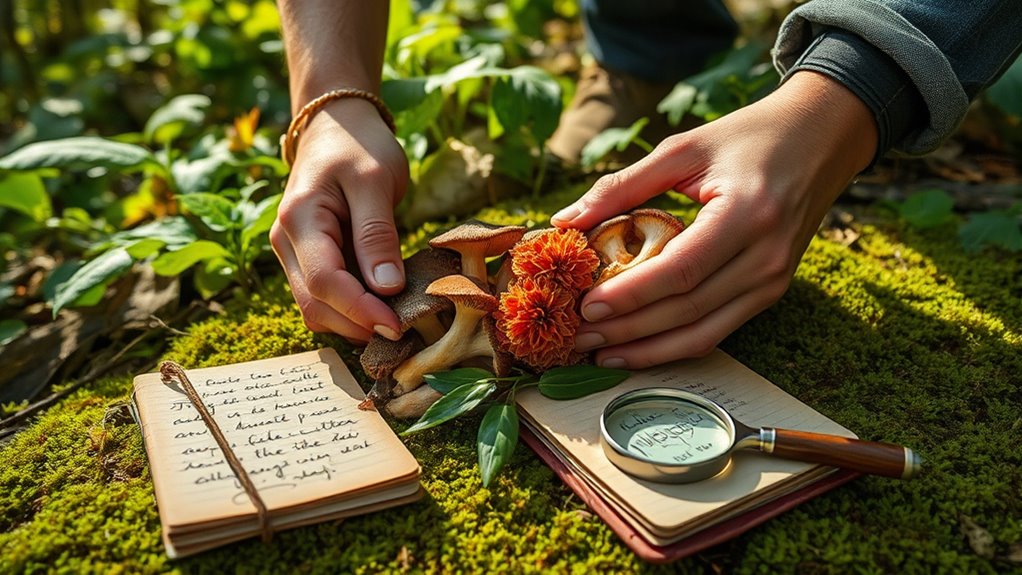
Understanding the ethical considerations and sustainable practices behind foraging helps guarantee you respect both the environment and legal boundaries. You should learn about local ecosystems and accurately identify plants to prevent harm and overharvesting. Protecting at-risk species maintains biodiversity and ensures future availability.
Minimize your impact by harvesting only what’s needed and being gentle with plants to allow regrowth. Adopt a give-back approach, supporting ecological balance. Follow sustainable harvesting guidelines, such as avoiding protected areas and monitoring your environmental footprint.
Participating in educational programs and community initiatives can deepen your understanding and promote responsible foraging. Regularly assess plant populations and consult environmental experts to prevent negative effects.
Foraging on Private Property: Permissions and Restrictions
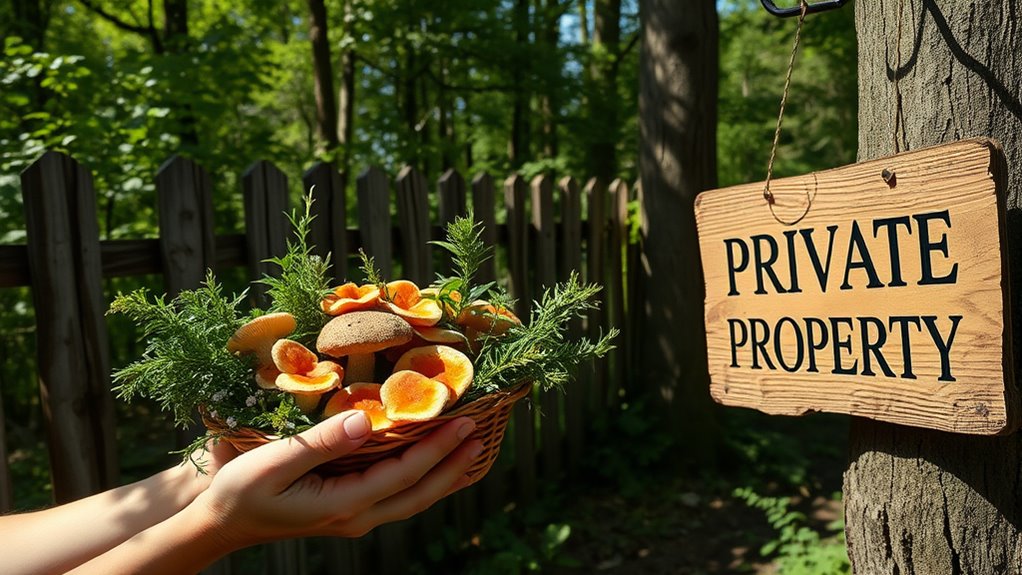
Accessing private property for foraging requires careful attention to legal permissions and restrictions. You must obtain explicit consent from the landowner before starting any foraging activities, especially if you plan to do so commercially.
Trespassing laws apply, and foraging without permission can lead to fines or even jail time, depending on your jurisdiction. Landowners have the right to set rules about what can be foraged and how, and they can revoke permission at any time if conditions aren’t met.
Enforcement of these restrictions is often handled by local law enforcement and relies on landowner reports. Be aware that state and local regulations may have additional requirements, such as permits or licenses, and environmental laws could impose further restrictions.
Always respect landowner rights and adhere to established rules.
Understanding legal aspects is crucial to ensure your foraging activities remain lawful and respectful of property rights.
Differentiating Personal Use From Commercial Foraging
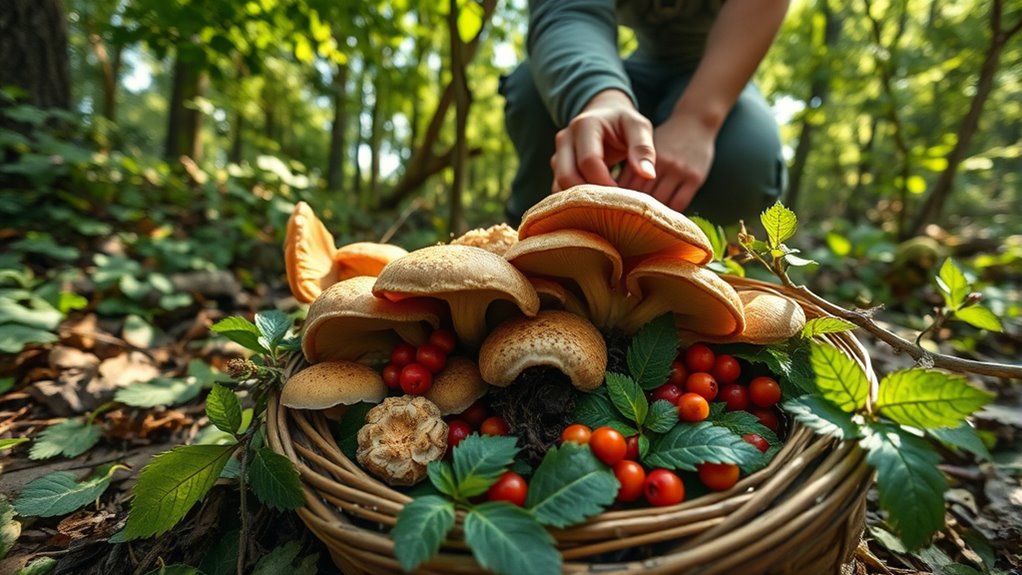
Knowing whether you’re foraging for personal use or engaging in commercial activities helps determine the legal requirements you’ll face. Personal use foraging usually involves minimal paperwork and lower costs, with harvest limits set to protect resources. If resources are abundant, you mightn’t even need a permit, but some species remain restricted regardless. Additionally, understanding auditory processing assessment components can help in evaluating the sustainability of harvesting practices. Recognizing wildlife conservation laws is also crucial to ensure compliance with environmental protections.
In contrast, commercial foraging requires special permits, higher fees, and compliance with stricter regulations to ensure sustainability. These permits often demand detailed documentation and environmental assessments.
The scope of restrictions widens for commercial operations, especially for protected species. Understanding the difference helps you avoid legal issues, as violations for either type can lead to fines, permit loss, or other penalties.
Always check local, state, and federal rules before harvesting.
Historical Evolution of Foraging Laws

The history of foraging laws reveals how legal restrictions have evolved alongside social, political, and economic changes. During the colonial era, laws aimed to control land use and displace Native Americans, favoring settlers.
Legal restrictions on foraging have evolved alongside social, political, and economic shifts throughout history.
European traditions originally allowed common land use but later became restricted. After the Civil War, laws targeted newly freed slaves, limiting their ability to forage independently.
Land Enclosure Acts from the 1400s onward reduced common lands, restricting access and affecting community livelihoods. Laws shifted to protect property rights, criminalizing trespassing and resource collection, often motivated by economic and conservation interests.
Colonialism expanded these restrictions, displacing indigenous peoples and suppressing cultural practices. Over time, these laws laid the groundwork for modern regulations, which now vary widely across regions.
Balancing Legal Regulations With Environmental and Cultural Values
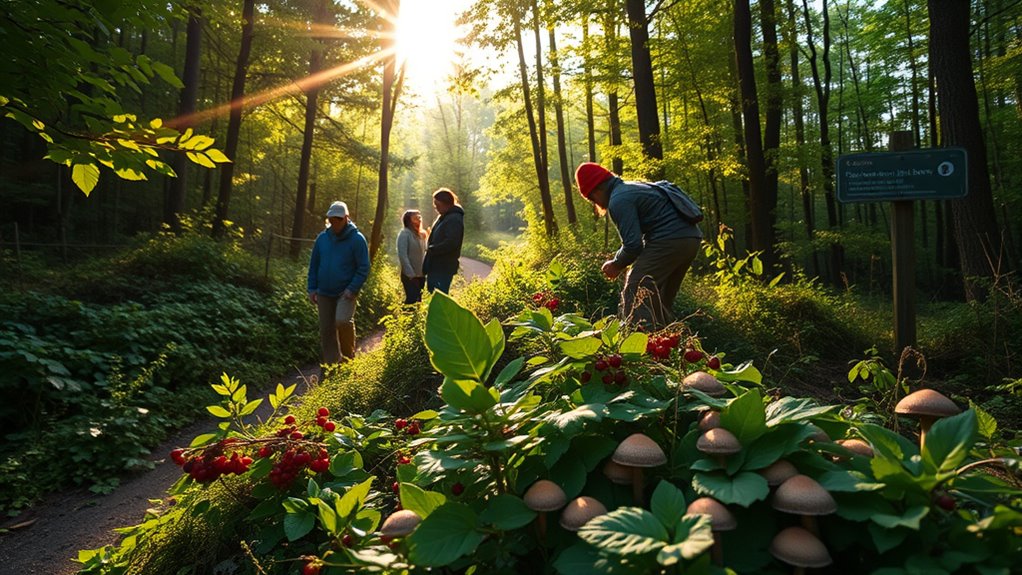
As laws surrounding foraging have evolved, balancing legal regulations with environmental and cultural values has become increasingly important. You need to understand that federal lands, like National Forests, require permits for forest products, which help protect ecosystems.
State laws vary—some permit limited foraging, others ban it entirely—so knowing local rules is vital. National Parks generally prohibit resource removal without permission, and laws also recognize the cultural significance of certain plants, especially for Indigenous communities.
Permits enforce sustainable practices, but they often come with fees and renewal requirements. Balancing these regulations with environmental goals, like conserving biodiversity and preventing habitat disruption, and respecting cultural practices ensures responsible foraging.
Engaging communities and reforming policies can help create a fair, sustainable framework.
Frequently Asked Questions
Can I Legally Forage in Urban Areas Despite Local Restrictions?
You wonder if you can forage in urban areas despite local restrictions. Generally, you can’t if the area prohibits foraging or if it’s private property without permission. Always check local laws and signage before gathering wild plants, fruits, or mushrooms.
Public parks may ban foraging, and trespassing on private land is illegal. To stay safe and legal, seek permission on private property and use resources like FallingFruit.org to find permitted spots.
Are There Specific Permits Required for Commercial Foraging Operations?
You definitely need specific permits for commercial foraging. Depending on your location and what you’re harvesting, you might require forest product permits, commercial plant permits, or nongame wildlife permits.
If you’re working on protected areas or private land, additional land management or landowner permissions could be necessary. Always check with local authorities or regulatory bodies to guarantee you have the correct permits, avoid fines, and stay compliant with laws.
How Do Foraging Laws Differ Between Public Parks and Private Lands?
Imagine exploring nature’s bounty, but remember, laws differ between public parks and private lands. In public parks, strict rules and permits often guide your foraging, with fines if you stray.
On private lands, you need permission directly from landowners, respecting their rights and boundaries. While enforcement varies, always seek permission first, honoring the land and its caretakers to make certain your foraging journey remains respectful and legal.
What Are the Legal Rights of Indigenous Communities Regarding Traditional Foraging?
You should know that Indigenous communities have preexisting rights to hunt, fish, and forage, recognized by treaties and laws. Despite colonial impacts and restrictions, many countries legally protect these rights.
Indigenous peoples often manage resources sustainably and their land stewardship is crucial for environmental health.
Supporting these rights through advocacy, respecting land access, and learning about their cultural practices help preserve their traditions and promote environmental conservation.
Can Foraging Be Prosecuted if Done Unintentionally in Restricted Zones?
You might think unintentional foraging in restricted zones is harmless, but laws still hold you accountable. If you accidentally pick plants in protected areas or without permission, you can face legal consequences like fines or even jail time.
Authorities often emphasize that ignorance isn’t a defense. So, stay aware of signage and regulations, and avoid unintentional violations to protect yourself from prosecution.
Conclusion
Guiding the legal landscape of foraging might seem intimidating, but understanding the rules protects both you and the environment. Think of laws as the roots holding a mighty tree—firm yet essential for growth. By respecting regulations, you guarantee future generations can also enjoy nature’s bounty. So, stay informed, seek permission when needed, and remember—your responsible foraging today plants the seeds for tomorrow’s wilderness.

